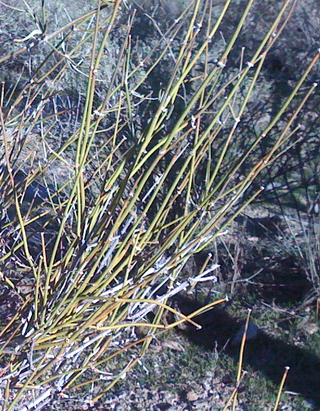Bonnetia fasciculata is a species of flowering plant in the Bonnetiaceae family. It is found only in Venezuela.
Dypsis fasciculata is a species of flowering plant in the family Arecaceae. It is found only in Madagascar. It is threatened by habitat loss.

The long-tailed porcupine is a species of rodent in the family Hystricidae. It is monotypic within the genus Trichys, and is found in Brunei, Indonesia, and Malaysia.
Aegiphila fasciculata is a species of tree in the family Lamiaceae. It is native to Central America, where it occurs in Guatemala, Honduras, and Nicaragua. It grows in humid forest habitat.

Athenaea fasciculata is a species of flowering plant in the family Solanaceae. It is a shrub or tree which grows in the coastal Atlantic Forest of eastern Brazil, and ranges inland to northeastern Argentina, Paraguay, and Bolivia.
Moquilea fasciculata is a species of plant in the family Chrysobalanaceae. It is endemic to Panama.
Morinda fasciculata is a species of plant in the family Rubiaceae. It is endemic to Ecuador.
Myristica fasciculata is a species of plant in the family Myristicaceae. It is endemic to Papua New Guinea.
Myrsine fasciculata is a species of plant in the family Primulaceae. It is endemic to the island of Raiatea in the Society Islands of French Polynesia.
Northia is a genus of plants in the family Sapotaceae.

Ryparosa is a genus of plants in the family Achariaceae.
Dendrocousinsia fasciculata is a species of plant in the family Euphorbiaceae. It is endemic to western and central Jamaica.
Trichilia fasciculata is a species of plant in the family Meliaceae. It is endemic to Brazil. It is threatened by habitat loss.

Ephedra fasciculata is a species of plant in the Ephedraceae family. Common names are Arizona ephedra, Arizona joint-fir, and desert Mormon-tea.

Tillandsia fasciculata, commonly known as the giant airplant, giant wild pine, or cardinal airplant, is a species of bromeliad that is native to Central America, Mexico, the West Indies, northern South America, and the southeastern United States. Within the United States, this airplant is at risk of extirpation from the Mexican bromeliad weevil, Metamasius callizona. A related plant, Tillandsia utriculata, sometimes called the "wild pine", is endemic to the same areas.
As of July 2016, the International Union for Conservation of Nature (IUCN) listed 238 conservation dependent species. That was 0.29% of all evaluated species listed at the time. The IUCN also lists seven subspecies and five varieties as conservation dependent.

Chamaecrista nictitans, the sensitive cassia, sensitive partridge pea, small partridge pea or wild sensitive plant, is a herbaceous species of legume widely distributed through the temperate and tropical Americas. It is an annual plant capable of rapid plant movement—its leaflets fold together when touched. However, a population at Haleakala National Park on the island of Maui, Hawaii, was reported as not being sensitive to touch.

Abebaia fasciculata is species of flowering plant in the family Sapotaceae. It is a tree native to Malesia and New Guinea. It is the sole species in genus Abebaia.

Grevillea fasciculata is a species of flowering plant in the family Proteaceae and is endemic to the south-west of Western Australia. It is a low, often spreading shrub with narrowly elliptic to more or less linear leaves and erect clusters of red and orange or orange and yellow flowers.

Ryparosa kurrangii is a rare plant in the family Achariaceae which is endemic to a very small part of the Queensland tropical rain forests. It is a small tree growing under the rainforest canopy, producing its flowers and fruit on the lower part of the trunk. It was previously considered to be a form of the Ryparosa javanica complex of species.









